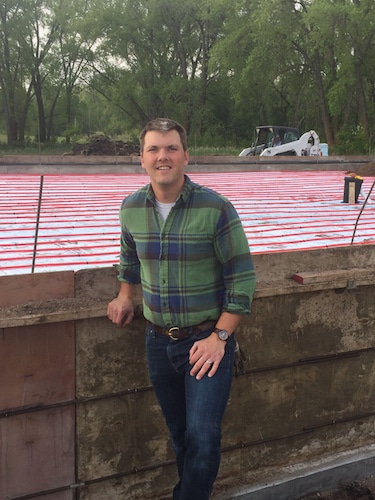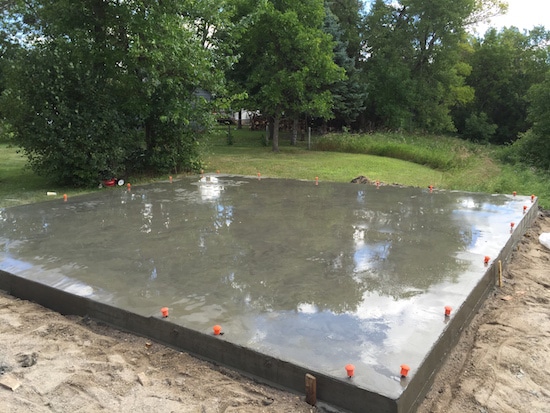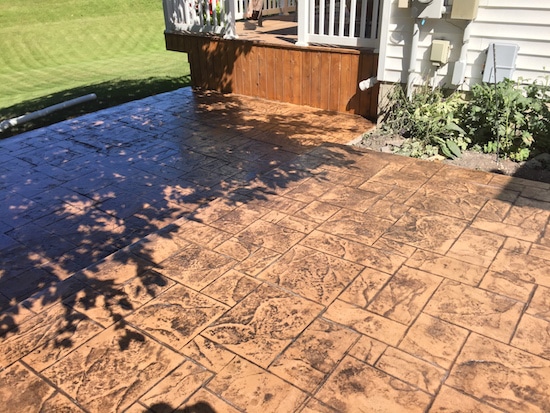
In 2014, we ran a series of articles extolling the virtues and eliminating the myths of the skilled trades. While we were able to cover a lot of ground, there wasn’t room to provide a detailed picture of all the various trades out there for men to pursue. So, as an accompaniment to our So You Want My Job series, we’re running regular installments of So You Want My Trade: interviews that offer an inside view of the pluses and minuses of various blue collar career choices.
Concrete foundations are, well, the foundation of the buildings we live in, work in, play in, and generally occupy. If the foundations aren’t built well, it spells serious trouble for those buildings, and boatloads of cash to repair (if it’s repairable at all!). Between planning, pouring, leveling, and all the other things that go into concrete masonry, it’s truly a job and career that requires skill, dedication, thoughtfulness, and plenty of hard work. In return, you’ll reap the satisfaction of knowing you created the literal foundation for someone’s dream.
I had the chance to interview Mark Johnson about being a concrete mason; I think you’ll find the conversation enlightening and enjoyable, and you may even consider his field for your next career.
1. Tell us a little about yourself (Where are you from? How old are you? Describe your job and how long you’ve been at it, etc.).
I’m Mark Johnson. My wife Skyler and I, along with our three children, live in East Grand Forks, which is a small town along the Red River in the Northwest corner of Minnesota. I am 32 years old, and for a majority of those years I have been a concrete mason.
I’d like to start with a little background of how I became a concrete mason. Since the 1970s my family has owned Johnson Concrete Construction which builds northwest MN’s finest foundations, slabs, and decorative concrete for farms, businesses, and residential customers.
My grandpa Ken founded the company in 1971. My dad, Tim, joined Grandpa in 1976. They worked together for many years until Grandpa eased into retirement around 1997. I then took my place in the great circle of life and became a partner in the company in 2008, becoming the third generation to own and operate Johnson Concrete.
Since my early days, I’ve been around concrete masonry. I don’t know how old I was when I started helping at job sites, but some of my earliest memories are of “working†beside Grandpa and Dad. I would carry around their finishing trowels, or lay out building materials in an effort to help. I began working seasonally full-time as a concrete laborer when I was about fourteen and have missed very few construction seasons since.
2. Why did you get into concrete masonry? You had other jobs/careers before this; what compelled you to make the switch?
Because Johnson Concrete is a small, family-owned business, I didn’t necessarily choose to be a concrete mason, like someone might choose being an attorney or an engineer. It is something I grew up doing and could not imagine life without concrete work. I have always been fascinated by the process, tools, techniques, and teamwork it takes to build a foundation. But, more than anything else, I am fascinated with the primal sense of accomplishment a concrete mason feels at the end of each day.
When you are exhausted from a hard day’s work, the concrete is finished, and the tools are put away, you can look at what you created and know that the thing you built is the manifestation of your effort, a testament to your skill and craftsmanship.
I have worked as a financial analyst and I am a licensed attorney, but neither of those professions have the deep satisfaction of concrete masonry. Take for example my experience as a financial analyst, where every process repeated itself on a quarterly basis with little connection to me as analyst. If we had a good quarter, the numbers on the spreadsheet grew larger. If it was a bad quarter, the numbers on that same spreadsheet were smaller. I had no control of the numbers, I didn’t even have much control of the formatting of the spreadsheet. Worst of all, the next quarter I would do the same reports over again! I wasn’t creating a legacy; I was spinning in a hamster wheel.
I think that is one of the most appealing things about concrete is that it has the potential to last forever. Therefore, building with concrete is like leaving a small testimony of who you are through the quality of your craftsmanship. It may sound dramatic, but every slab or wall I build I think about somebody, generations from now, evaluating who I was based on my work.
I have recently added another job title to my resume: state senate candidate. Being a concrete mason has prepared me in so many ways to participate in the political realm, but the greatest lesson is that, if I build something well, future generations will benefit from my work. So I want to create legislation like I build foundations, with skill and quality that will benefit generations to come.
3. Tell us a little bit about what you do as a concrete mason. I’m sure a lot of people didn’t even know that such a career existed!

Depending on the size of company or if it is a union employer, a concrete mason may have one task or many. There are three main tasks for every concrete job: (1) building the formwork and taking it down, (2) pouring the concrete, and (3) finishing the concrete.
If the concrete mason works for a small company all three tasks are going to be part of the job description. But in larger companies or union shops a mason may be responsible for only one task or even a subset of a task such as tying rebar, reinforcing steel, or running a motorized troweler.
Like most jobs, there are standard levels of advancement in the trade. A concrete mason starts out as a laborer. Much like an apprentice, a laborer has little knowledge of the trade and is learning the skills and techniques required to become proficient. Once a level of proficiency is reached, that person may pick a specialty, such as form setting or concrete finishing. If that person continues to grow in proficiency, they may be promoted to foreman.
A foreman directs or “runs†a crew to accomplish tasks on a job. A foreman manages the crew, materials, and schedule to ensure their tasks are done on time. The final promotion is to superintendent. On large commercial, governmental, or industrial jobs there may be many crews running at one time. The job of the superintendent is to ensure these crews get the job done right, on time, and on budget.
4. Describe for us an average work day.

In a typical day of work, I get up around 5:30 am, have breakfast, pack a lunch, fill a water jug, and leave on time to get to the job site around 7:30 am. Most of our jobs are about an hour drive from where I live, so I have a little windshield time to catch up on the latest AoM podcast or get my daily mental to-do list formed.
Once everyone arrives at the job, we brief the crew of 4-5 employees on what we want to accomplish that day. Daily tasks can be separated into two buckets: slab or poured foundation wall. These tasks vary greatly and require different preparation.
A slab is concrete such as a garage floor, driveway, decorative patio, or a home’s foundation. It is usually poured on the ground with the top surface leveled by a screed and finished with a broom or steel trowel. These require minimal forming but lots of attention when finishing the surface of the slab.
A poured foundation wall is just what it sounds like; a concrete wall. Foundation walls are typically used in homes and under large, heavy buildings that need to transfer weight to the solid ground below the top soil. Also, where I live, foundation walls are important because frost can creep under a building if its foundation isn’t deep enough, and it can move the entire structure! Walls require a significant amount of forming, but little finishing of the concrete’s surface.
If we are working on a slab project, we often try to build the forms and pour concrete on the same day. However, if other trades (plumbers, electricians, or HVAC) need to place their pipes, wires, or conduit in the concrete, it may take several days before the project is ready to pour. Walls, on the other hand, typically can be set one day and poured the next.
When we have finished our work for the day and the tools are cleaned and put away. The crew sits down and fills out timecards. Then off for home around 6:00 or 7:00 pm.
5. What was your path to becoming a concrete mason? What kind of training and certifications did you need? Did you go to trade school?
Concrete is learned on the job. Unlike plumbers or electricians, concrete masons don’t need a special certification, nor are there many (if any) trade schools that teach the skills needed to become a proficient concrete mason. The industry is much like the old apprentice system for bakers or carpenters, if you want to learn how to build with concrete, you work for someone who is willing to teach you the skills necessary to become a skilled tradesman.
Today, we have programs, certifications, and barriers to entry for nearly every imaginable occupation. So people become suspicious of a trade that does not have the vetting processes other trades have acquired. Customers sometimes worry about the qualifications of a concrete mason because they do not have the formal education the other trades may have, but our trade quickly weeds out the incompetent or bad actors. A person’s reputation has a way of getting around quickly. If a concrete mason earns a bad reputation it is highly unlikely that tradesperson will find a job. So although our industry is very informal, it has a natural way separating the wheat from the chaff.

6. How do you find work as a mason? What’s the job market like? What can someone expect to earn in this field?
For a concrete construction company in northwest MN and eastern ND, concrete laborers are hard to find, and skilled labor is nearly impossible. So whether a person is skilled or unskilled, most concrete companies are willing to hire (granted they pass the standard hiring prerequisites). Unions are one way to find a job as a tradesman, but our area has very little union presence, so most of the work is found by personally contacting the company who is hiring.
Our area has been blessed with a good farming economy and a recent oil boom not far away in western ND. So our job market has remained strong. In fact, when most of the housing market across the country crashed in 2008, ours kept growing. We had a hard time keeping up demand because some of those who may have chosen to become concrete masons moved west to work in the growing oil industry. The boom has since slowed and farm commodity prices are much lower. There is still plenty of building, but the pace has slowed slightly. So if a qualified person wants to become a concrete mason, there are many opportunities to do so.
In terms of earnings, starting hourly wages for a laborer start at $12, but, once they gain experience and proficiency, a laborer can make up to $16 per hour. Once a person becomes a finisher they can expect to earn $20-$30, and a foreman will make between $25-$35. These are specific to my region, but I would imagine they would be similar in other regions as well.
7. What is the work/life balance like in your career?
Balance? What’s that? During the construction season in northwest MN a mason can expect to work from early in the morning to dusk. We only get eight months to get our projects done around here, so we make the most of every day. I don’t see much of my wife and three children during the week because they are in bed when I leave and most nights the kids are in bed when I get home.
I love spending time with my family, so it is very hard to be away from them that much. However, during the winter months we get to make up some of the lost time, because we have nearly four months off in the winter of a typical year.
I think of this cycle a little like something our Viking ancestors would be accustomed to — spending their summers out on the voyages and making a living and then back to their homes for the winter months to enjoy their summer profits. Perhaps it’s a stretch, but it gives you an idea of the work/life balance I have as a concrete mason.
8. What’s the best part of your career?

The best part of my job is fulfilling someone’s dream. Whether it’s a house, business, or farm project — somebody has been dreaming about the day they get to start building. So I am literally building a foundation for a customer’s dream. The construction is a culmination of everything they have worked so hard for. It is a great honor of mine to help fulfill a customer’s longtime dream through my skill as a concrete mason.
9. What’s the worst part?
Long hours, being away from home, delays, and unexpected machine failure are all things I dislike about being a concrete mason. But the worst part is any failure in communication with the customer. Being on the same page about the design and finish of a project with your customer is soooo important. We are very careful to understand what exactly the customer is expecting because nothing is more disappointing than unmet expectations. There is nothing worse for a concrete mason than to feel like you did a great job on a project only to discover the customer is not happy because they expected something different.
10. What’s the biggest misconception people have about your job?
I think Mike Rowe would agree, having a manual labor job is not dishonorable! Folks tend to avoid becoming someone like a concrete mason because it lacks the prestige associated with other jobs. I know of many people who would rather work in jobs that they are not particularly interested in simply because it carries more respect than a higher-paying manual labor job. I think if people were able to shake off this notion of prestige, for even just a short time, they may find the satisfaction that creating something with your hands can bring.
11. If you had to give a young man just starting in on his career one piece of advice, what would it be?
Be willing and be useful. There are two things I look for in a good concrete mason: a willingness to work and a desire to be useful. If someone possesses those two qualities, he will not just be a successful concrete mason, he will be a successful person in whatever he chooses.
Tags: So You Want My Job

